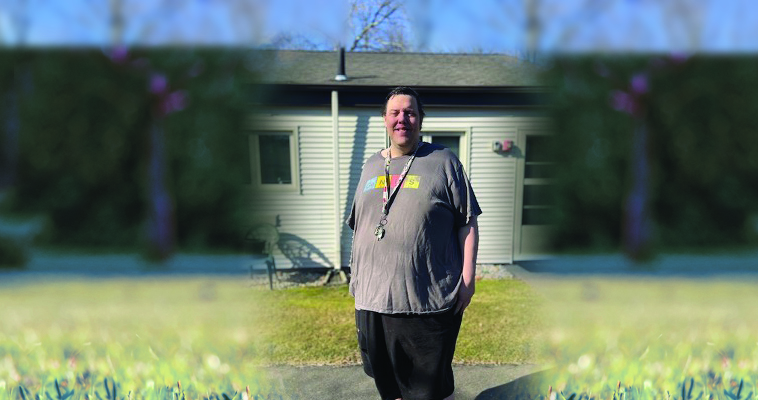
Randy continues to be a fighter after the many challenges life has dealt. For nearly a decade, Randy advanced in his positions at Peapod, worked hard, made a good salary, and took annual trips to Disney World. One day in 2016 he wasn’t feeling well and discovered he had an infection in his back. What followed was major back surgery, months of being bedridden, and learning how to walk again. One doctor said it was a miracle he was still alive. He was alive but unable to work. For six years, he was frequently hospitalized, due to major health issues such a blood clot in the brain and complications from diabetes, edema, and obesity. During this time, he lived with a roommate and her dog and enjoyed the company of doing things together. Unfortunately, he was challenged once again when his roommate died following a surgery. Randy could no longer afford the two-bedroom apartment and could not find an apartment he could afford on his own, forcing him to live in his car for 2 weeks. Depression and homelessness led to a serious decline in his health. After 8 months, including another hospitalization, and transfer to two nursing facilities, Randy finally transitioned with the help of Money Follows the Person (MFP) to an accessible apartment which he loves!
Prior to living in the nursing facility, he had called towns to be placed on their affordable housing wait lists. Once he connected with a nursing facility ombudsman, the process of applying for MFP started. The facility social worker then connected him with a case manager and transition coordinator (TC) at MFP. Because Randy was proactive and already on several housing lists, he was called quickly when an apartment reserved for older adult or people with disabilities became available. “The TC was awesome! She furnished the new apartment, making sure it was clean and the bed was made. Every week she calls and every month she checks up on me.”
His two personal care assistants (PCAs) have been wonderful, supporting Randy with housekeeping, laundry, transportation to appointments, grocery shopping, cooking if needed, and “keeping me company.” “They get me out of the house to walk around the park, sometimes go to movies, and shop.” The apartment is located close to the police station, pool, library, and community center where he goes to relax or attend a get together. Living in the community, he hears children playing baseball or soccer. There is also a walking trail. Now he has an accessible apartment with a pull cord for safety, support from the PCAs, and community connections. These supports, along with managing his medication and eating healthier food, have helped Randy lose 100 pounds! He is no longer depressed and is in control of his health issues. Before he describes himself being “close to the edge.” Last year, he didn’t know when his next meal was going to be. Now his refrigerator is filled with chicken and other healthy food. Randy finally celebrated this past Thanksgiving with his cousins and uncle for the first time in two years. His family is very proud of his achievements, which means so much to him.
He visits his friends in the nursing facility, encouraging those who are wondering if they, too, can transition to the community. Randy found the hardest changes were adjusting to being alone, not having a routine, making sure to not run out of medication, getting used to cooking, and meeting new people. He wants others to know that they are not alone. MFP will help set you up and will check on you once you are out of the nursing facility.
Randy has already rented a car and traveled to VT and the casinos. His next goal is to revisit the magical land called Disney World once again.
Read the CT Money Follows the Person Quarterly Report
MFP Demonstration Background
The Money Follows the Person Rebalancing Demonstration, created by Section 6071 of the Deficit Reduction Act of 2005, supports States’ efforts to “rebalance” their long-term support systems, so that individuals can choose where to live and receive services. One of the major objectives of Money Follows the Person (MFP) is “to increase the use of home and community based, rather than institutional, long-term care services.” MFP supports this by offering grantee States an enhanced Federal Medical Assistance Percentage on qualified services. MFP also offers states the flexibility to provide supplemental services, such as assistive technology and enhanced transition services, to assist in successful transitions. States are then expected to reinvest the savings over the cost of institutional services to rebalance their long-term services and supports for older adults and people with disabilities to a community-based orientation.
